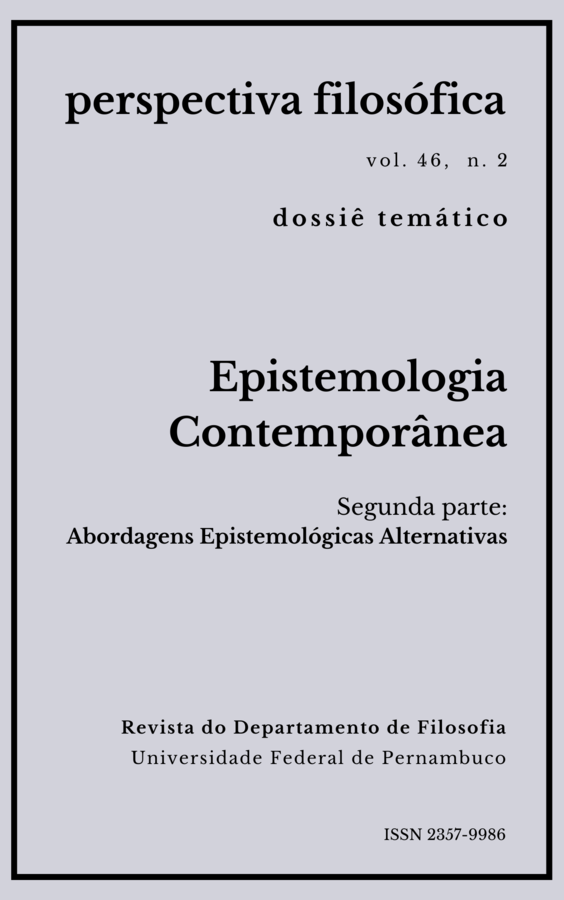Por um pluralismo de estratégias nas ciências cognitivas
DOI:
https://doi.org/10.51359/2357-9986.2019.248073Keywords:
Cognitivism, enactivism, Hugh Lacey, William Ramsey, 4ecognitionAbstract
Cognitive Sciences, as an interdisciplinary area, began to develop in themid-1950s from a common conception of the mind, which is called cognitivist. These researchers conceived the mind as having a representa-tional nature, which operated through symbolic computations. In recentdecades, however, this conception has lost exclusivity, so that today thereare a multiplicity of approaches and theories about the mind. In this spec-trum of positions, there are from traditional approaches, which conceive themind as representational, to quite radical approaches, which deny any repre-sentational nature to the mind. After introducing this theme, we presentWilliam Ramsey’s criticisms of the representation as a criterion of cognitivedemarcation or, in other words, of the representation as a definer of cogni-tive sciences. We will develop an interpretive hypothesis for Ramsey’s criti-cisms by mobilizing Hugh Lacey’s concept of research strategy. We willpresent Lacey’s distinction between adopting a strategy and accepting a the-ory, discussing the supposed evaluative independence between strategy andtheory. We will conclude with a defense of pluralism of strategies in cogni-tive sciences. Unlike conceptions that seek to prematurely reduce cognitivesciences to a single strategy, this pluralism balances efficiency with othervalues considered important, such as empirical comprehensiveness and neu-trality in the sense of inclusiveness and equity of values. In the present mo-ment of cognitive sciences, pluralism of strategies consists in the mostpromising path.References
ALLEN, Colin. On (not) defining cognition. Synthese, v.194, n.11, p. 4233–4249, 2017.
CHEMERO, Anthony. Radical embodied cognitive science. Cambridge: MIT Press, 2009.
CLARK, Andy; CHALMERS, David J. The extended mind. Analysis, v.58, n.1, p. 7–19, 1998.
GIBSON, James J. The theory of affordances. In: R. E. Shaw; J. D. Bransford (eds.) Perceiving, acting, and knowing. Mahwah: Lawrence Erlbaum Associates, 1977.
GIBSON, James J. The ecological approach to visual perception. Classical Edition. New York: Psychology Press, 2015.
HUTTO, Daniel D.; MYIN, Erik. Radicalizing enactivism: basic minds without content. Cambridge: MIT Press, 2013.
HUTTO, Daniel D.; MYIN, Erik . Evolving enactivism: basic minds meet content. Cambridge: MIT Press, 2017.
KUHN, Thomas. The structure of scientific revolutions. 2. ed. Chicago: University of Chicago Press, 1970.
LACEY, Hugh. Is science value free? Values and scientific understanding. London: Routledge, 1999.
LACEY, Hugh. Psicologia experimental e natureza humana: ensaios de filosofia da psicologia. Florianópolis: Núcleo de Epistemologia e Lógica da Universidade Federal de Santa Catarina, 2001.
LACEY, Hugh. Tecnociência comercialmente orientada ou investigação multiestratégica? Scientiae Studia, v.12, n.4, p. 669–695, 2014.
LACEY, Hugh; MARICONDA, Pablo. O modelo das interações entre os valores e as atividades científicas. Scientiae Studia, v.12, n.4, p. 643–668, 2014.
LAUDAN, Larry. Progress and its problems. Berkeley: University of California Press, 1977.
MATURANA, Humberto. R.; VARELA Francisco J. Autopoiesis and cognition: the realization of the living. Dordrecht: D. Reidel, 1980.
MATURANA, Humberto. R.; VARELA Francisco J. The tree of knowledge: the biological roots of human understanding. Boston: Shambala Books/New Science Library, 1987.
MILKOWSKI, Marcin. Fallible heuristics and evaluation of research traditions: the case of embodied cognition. Ruch Filozoficzny, v.75, n.2, p. 221–236, 2019.
NEWEN, Albert; DE BRUIN, Leon; GALLAGHER, Shaun (eds). The Oxford Handbook of 4E Cognition. Oxford: Oxford University Press, 2018.
NÖE, Alva. Action in perception. Cambridge: The MIT Press, 2004.
NÖE, Alva. Varieties of presence. Cambridge: Harvard University Press, 2012.
NÖE, Alva. Sensations and situations: A sensorimotor integrationist approach.
Journal of Consciousness Studies, v.23, n.5, p. 66–79, 2016.
O’REGAN, J. Kevin; NOË, Alva. A sensorimotor account of vision and visual consciousness. Behavioral and Brain Sciences, v.24, n.5, p. 939–973, 2001.
RAMSEY, William. Must cognition be representational? Synthese, v.194, n.11, p. 4197–4214, 2017.
REIS, Claudio R. M. Ciência e valores: em defesa de um pluralismo sensível ao contexto. Tese (Doutorado em Filosofia) – Universidade Federal do Rio Grande do Sul. Porto Alegre, 2019.
ROLLA, Giovanni; CARVALHO, Eros M. O desafio da integração explanatória para o enativismo: escalonamento ascendente ou descendente. Prometeus, v.11, n.33, p. 161–181, 2020.
THAGARD, PAUL. Mind: Introduction to cognitive science. 2. ed. Cambridge: MIT Press, 2005.
THAGARD, PAUL. Cognitive Science. The Stanford Encyclopedia of Philosophy, 2019. Disponível em: <https://plato.stanford.edu/archives/spr2019/entries/cognitive-science/>. Acesso em: 20/06/2020.
VARELA, Francisco. Principles of biological autonomy. New York: North Holland, 1979.
WILSON, Robert A.; FOGLIA, Lucia. Embodied Cognition. The Stanford Encyclopedia of Philosophy, 2017. Disponível em: <https://plato.stanford.edu/archives/spr2017/entries/embodied-cognition/>. Acesso em: 20/06/2020.
Downloads
Published
Issue
Section
License
A Revista Perspectiva Filosófica orienta seus procedimentos de gestão de artigos conforme as diretrizes básicas formuladas pelo Conselho Nacional de Desenvolvimento Científico e Tecnológico (CNPq). http://www.cnpq.br/web/guest/diretrizesAutores que publicam nesta revista concordam com os seguintes termos:
Os autores mantém os direitos autorais e concedem à revista o direito de primeira publicação, sendo o trabalho simultaneamente licenciado sob https://creativecommons.org/licenses/by/4.0/deed.pt_BR que permite o compartilhamento do trabalho com reconhecimento da autoria e publicação inicial nesta revista.
Os autores têm autorização para assumir contratos adicionais separadamente, para distribuição não-exclusiva da versão do trabalho publicada nesta revista, com reconhecimento de autoria e publicação inicial nesta revista (Consultar http://opcit.eprints.org/oacitation-biblio.html).

Esta revista está licenciada com uma Licença Creative Commons Atribuição 4.0 Internacional.













